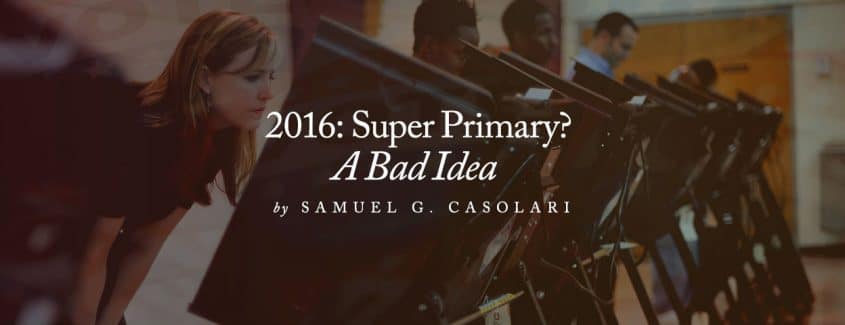
After losing New Hampshire, Florida, and Illinois, the presidential candidate limped along with declining support and amid calls for his withdrawal from the race. He was short of funds with a thin organization. He was a beleaguered candidate.
Then came the Republican primary in North Carolina, where that candidate, Ronald Reagan, defeated the incumbent president, Gerald Ford. Reagan’s North Carolina win reversed the course of his campaign and he ultimately came within a hair of defeating Gerald Ford for the presidential nomination in 1976. Though he lost in 1976, Ronald Reagan set the foundation for his victory in 1980, and that foundation can be traced to the North Carolina primary.
A plan is now in the works to have a super Republican primary in the south in early March 2016. This primary may involve as many as five or more states. It is a bad idea, especially for conservatives. It is a bad idea for five reasons:
First, the conservative vote is likely to be divided among many candidates, including several southern candidates. An establishment candidate could easily win this super primary with only 20 or 25 percent of the vote.
The most recent Real Clear Politics average for the Republican presidential race illustrates this fact. Jeb Bush and Chris Christie have a combined vote of 28.2 percent. When the combined percentages of Rand Paul, Mike Huckabee, Ben Carson, Scott Walker, Ted Cruz, Marco Rubio, Rick Perry, and Bobby Jindal are added the total is 46.9 percent. The combined conservative vote crushes both Bush and Christie. The conservative share of the vote is even larger if the percentages of government-friendly conservatives like Paul Ryan and John Kasich are added. A southern super primary with multiple candidates would divide the conservative vote and allow a more moderate candidate to win by a small plurality.
Second, a super primary makes it difficult for non-southern candidates to compete on such a wide scale. For instance, Scott Walker or Mike Pence may have a more difficult time competing in a regional southern primary than they would in one or two southern states at a time. The fledgling candidacy of Ronald Reagan in 1976 may have been more difficult if he were forced to compete in a regional primary with little funds and a thin organization.
Third, a regional primary invites powerful political action committees to spend vast sums of money in favor of preferred candidates. This would be a distinct disadvantage to credible conservative candidates who could compete better on a state-by-state basis. Large and powerful donors could direct large sums of money into a regional primary to game the system and allow establishment friendly candidates to win small pluralities.
Fourth, a regional primary takes the focus off the issues and detracts from old-fashioned retail politics. The best way to know and understand a candidate—and the best way to test a candidate—is through the primary process. The process is diluted when it gets combined into regional primaries. The regional primary favors more established candidates and takes the focus off of new and aspiring candidates who may win a primary or two and then go on to greater success throughout the primary process. Jimmy Carter proved his mettle in 1976 and so did Barack Obama in 2008.
Finally, we are a federal system. The role of the state is important both in terms of how we are governed and how we elect presidents. A regional primary will diminish the power of states. Curiously, it may very well dilute the ability of the south to influence the presidential process. Nonetheless, states play important roles in American presidential politics. Whether it was John F. Kennedy in West Virginia, Ronald Reagan in North Carolina, Jimmy Carter in Florida, or George W. Bush in South Carolina, state contests test the candidates, help define the issues, and encourage debate.
A plan for a super Republican primary in 2016 is a bad idea. For conservatives, the better route is a state-by-state contest of the issues and not a super primary where money, names, and organization trump ideas.


